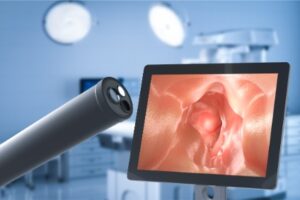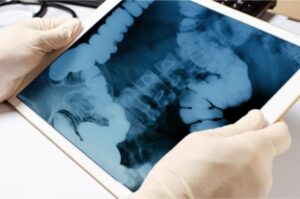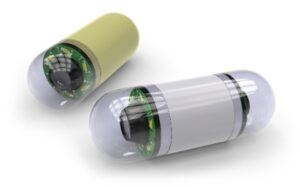Dr. Afzal will perform your procedure safely, respectfully and expertly, with the utmost professionalism. If your situation is urgent, we will do all we can to complete your procedure as soon as possible. Please call 833-368-8688 when your physician is recommending an urgent diagnostic or treatment procedure.
Procedures
Colonoscopy/Colon Cancer Screening

Colonoscopy/Colon Cancer Screening
If you are at average risk for colon cancer (about 1 in 20 lifetime risk), we recommend a screening colonoscopy procedure at the age of 45. We may recommend a screening sooner if you have a family history of colon cancer, elevated risk factors such as genetic predisposition or certain medical conditions. Most insurances cover the screening colonoscopy at 100% without a deductible being applied.
Colonoscopy is performed under sedation. It is used to internally examine your large intestine and rectum for inflammation, polyps, and abnormal tissue.
“Colon cancer is one of the few cancers that can be prevented by screening. Most other screening tests detect cancer at early stages; colonoscopy and removal of polyps prevents the occurrence of colon cancer. It is considered the gold standard screening test for colon cancer,” says Dr. Afzal.
EGD

EGD
An esophagogastroduodenoscopy (EGD), is an examination of your esophagus, stomach and duodenum using a flexible endoscope, may be performed when you are experiencing heartburn or acid reflux, swallowing difficulties, chronic nausea or vomiting or unexplained weight loss. EGD is also utilized for diagnosis of gastrointestinal issues such as h. pylori infection, checking for premalignant conditions such as Barrett’s esophagus, diagnosing ulcers, checking for celiac disease to name a few.
ERCP

ERCP
Both x-ray and endoscopy are used to perform endoscopic retrograde cholangiopancreatography. ERCP is used to detect and treat conditions of the bile and pancreatic ducts. These conditions can include investigating and treatment of jaundice, narrowed or blocked ducts, gallstones, infections, pancreatitis and tumors of these organs.
Capsule Endoscopy

Capsule Endoscopy
A wireless camera, about 1” long by ½” wide, is swallowed and records images of your digestive system, particularly the small intestine. The capsule passes your body through a bowel movement, leaving your body entirely.
We may recommend a capsule endoscopy if you are experiencing bleeding or we suspect a condition such as inflammatory bowel disease, or polyps of the small intestine.
